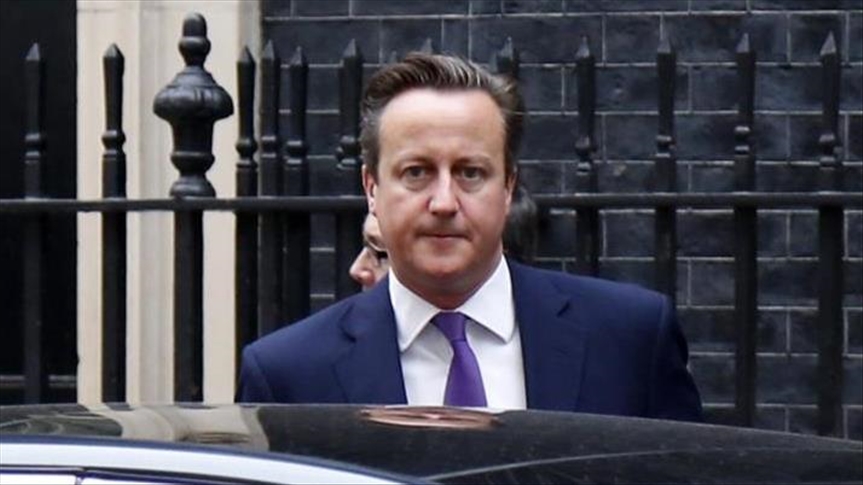Former UK premier made $10M from failed financial firm: BBC
David Cameron's lobbying of British government on behalf of firm was major scandal in British press

LONDON
BBC Panorama broadcast an investigation Monday which claimed that former British Prime Minister David Cameron made about $10 million from failed financial firm Greensill Capital, according to documents obtained by the program.
Cameron’s lobbying of the British government on behalf of the firm was a major scandal in the British press.
BBC reported that the documents suggested that Cameron received $4.5 million after cashing in Greensill shares in 2019.
He also reportedly received a salary of $1 million a year as a part-time adviser.
The BBC program also claimed that Cameron was paid a $700,000 bonus in 2019 in addition to his salary.
BBC Panorama estimated that Cameron made $10 million before tax for two and a half years of part-time work.
The firm went into administration in March, with investors facing billions in losses. Its collapse was triggered by its insurer refusing to renew cover for its loans.
Greensill made money through supply chain finance. This is where the firm would make loans to companies that are still waiting for invoices to be paid by the customers. The money would then be repaid with interest.
Cameron had tried and failed to convince the government to invest British taxpayer money into the firm’s loans.
Following an investigation, he was found not to have broken lobbying rules but nevertheless displayed a “significant lack of judgement.”
Cameron’s spokesman was quoted by the BBC as saying: “He acted in good faith at all times and there was no wrongdoing in any of the actions he took.”
GFG Alliance, a group of companies controlled by steel magnate Sanjeev Gupta, was one of Greensill’s clients. After they became unable to pay back Greensill loans due to financial difficulties, Greensill itself ran into financial difficulties.
Initially, Greensill used its own money to plug holes in GFG’s finances, meaning investors were not aware that there were problems.
Rather than raise the alarm, Greensill looked for a new investor – the British government. This is where Cameron came into the picture.
He was deployed to make the deal happen, and to that end bombarded government ministers and senior civil servants with 56 messages with the aim of getting the Bank of England, the UK’s central bank, to invest over £10 billion ($13.85 billion) of British taxpayer money into Greensill loans.
The Bank of England turned Greensill down.
In June 2020, however, Greensill was accepted as a lender under the government’s Coronavirus Large Business Interruption Loan (CLBIL) scheme, which was created to give emergency money to companies affected by the COVID-19 pandemic.
Under the CLBIL scheme, Greensill could make loans backed with an 80% taxpayer guarantee. However, it was only supposed to lend a maximum of £50 million ($69.24 million) to a single borrower or group of companies.
Greensill, however, lent GFG £350 million by making seven separate taxpayer-backed loans of £50 million to seven of Gupta’s companies. An eighth loan of £50 million was made to another company with close links to Gupta.
All the companies have failed to make repayments on the taxpayer-backed loans, according to the BBC.
The British government is now investigating the loans and in the meantime has suspended the government guarantee. This decision is being challenged, however, meaning British taxpayers could still lose £320 million ($443.12 million).
GFG Alliance and its financing arrangements with Greensill Capital are now under investigation by the Serious Fraud Office.
GFG has strenuously denied all allegations of improper conduct and was quoted by the BBC as saying: “We remain fully committed to UK industry and to a solution that will enable GFG to repay creditors and create a sustainable future for its UK businesses.”
Cameron’s spokesman was quoted by the BBC as saying that the former prime minister was not involved in lending decisions and had no knowledge of GFG’s financial situation.
“He was a part-time adviser to the company -- one of several -- and had no Executive or Board responsibilities whatsoever,” he said.
“He made the representations he did to the UK government not just because he thought it would benefit the company, but because he sincerely believed there would be a material benefit for UK businesses at a challenging time.”
Anadolu Agency website contains only a portion of the news stories offered to subscribers in the AA News Broadcasting System (HAS), and in summarized form. Please contact us for subscription options.







